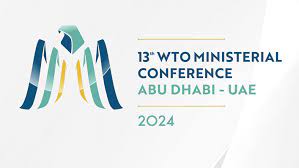The 13th WTO Ministerial Conference (MC13) has been extended by one day, until Friday 1 March, in order to facilitate outcomes on the main issues at stake.
Following the consultations by WTO Director-General Ngozi Okonjo-Iweala with the MC13 Chair, Dr Thani bin Ahmed Al Zeyoudi, and the Minister Facilitators, delegations were informed that MC13 will be extended, with the closing session scheduled to begin at 2pm Abu Dhabi time.
At the meeting of Heads of Delegation (HoDs) on 28 February, DG Okonjo-Iweala called on members to go the extra mile to find convergence on the various negotiations at the ministerial gathering and to be mindful that time is running out to conclude meaningful agreements.
The 13th Ministerial Conference was initially scheduled to close today (29 February) at 8pm Abu Dhabi time.
Some delegates expressed scepticism that a deal would be reached by then, that serious differences remained on a range of issues meant to address global trade.
“Tense! Difficult,” said one delegate on condition of anonymity.
India’s trade minister said he was “sad” some countries were still obstructing significant outcomes. He gave little sign New Delhi would drop its opposition to extending a waiver on digital tariffs.
“Of course we feel sad that some countries are still obstructing significant outcomes that could have helped less developed countries and developing countries gain confidence in the working of WTO,” Piyush Goyal told reporters on the final day of the talks.
Still, he voiced optimism that “significant outcomes” could be achieved in the negotiations.
A grouping of Pacific islands, including Papua New Guinea and the Solomon Islands, were also opposing a draft deal on changes to fisheries subsidies, with Fiji’s deputy prime minister and Trade Minister Manoa Kamikamica said it did not go far enough.
“We would like the large subsidising countries to put a cap on the current level of subsidies,” Kamikamica said.
India’s Goyal did not name the countries that he said were blocking results at the talks. But he said his top priority was fixing the WTO’s dispute system, adding he had raised the lack of progress with U.S. Trade Representative Katherine Tai in a Wednesday meeting.
“The first and highest priority is to get the Appellate Body of the dispute resolution mechanism in place because without that all the decisions we are taking cannot be adjudicated upon,” he said.
The WTO’s top appeals court has been hamstrung for four years due to U.S. opposition to judge appointments and remains out of service. Tai already ruled out an agreement on WTO dispute settlement appeals reform this week, but said negotiations were showing progress.
Asked whether India would drop its opposition to a waiver on tariffs on digital goods like film downloads, he said: “Let us see what everybody else is budging on”.










